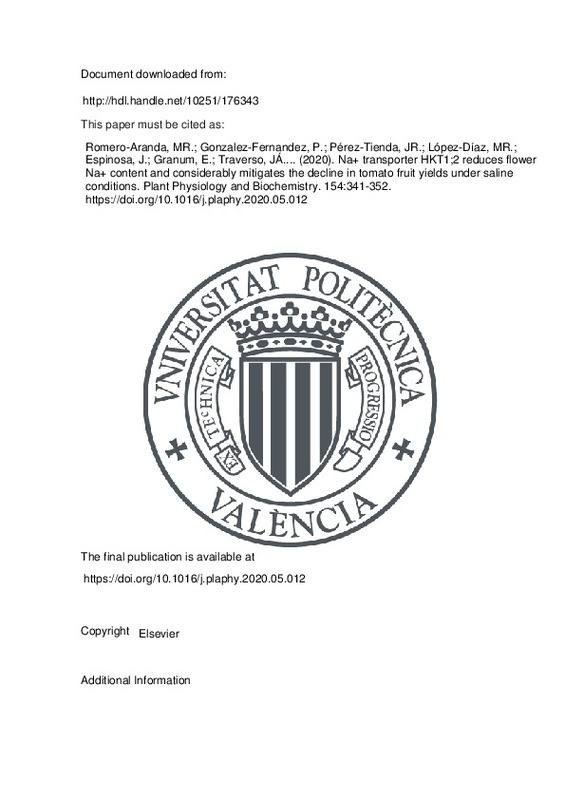JavaScript is disabled for your browser. Some features of this site may not work without it.
Buscar en RiuNet
Listar
Mi cuenta
Estadísticas
Ayuda RiuNet
Admin. UPV
Na+ transporter HKT1;2 reduces flower Na+ content and considerably mitigates the decline in tomato fruit yields under saline conditions
Mostrar el registro sencillo del ítem
Ficheros en el ítem
| dc.contributor.author | Romero-Aranda, María Remedios
|
es_ES |
| dc.contributor.author | Gonzalez-Fernandez, Paloma
|
es_ES |
| dc.contributor.author | Pérez-Tienda, Jacob Rafael
|
es_ES |
| dc.contributor.author | López-Díaz, María Remedios
|
es_ES |
| dc.contributor.author | Espinosa, Jesús
|
es_ES |
| dc.contributor.author | Granum, Espen
|
es_ES |
| dc.contributor.author | Traverso, Jose Ángel
|
es_ES |
| dc.contributor.author | Pineda Chaza, Benito José
|
es_ES |
| dc.contributor.author | García Sogo, Begoña
|
es_ES |
| dc.contributor.author | Moreno Ferrero, Vicente
|
es_ES |
| dc.contributor.author | Asins, María José
|
es_ES |
| dc.contributor.author | Belver, Andrés
|
es_ES |
| dc.date.accessioned | 2021-11-05T14:08:44Z | |
| dc.date.available | 2021-11-05T14:08:44Z | |
| dc.date.issued | 2020-09 | es_ES |
| dc.identifier.issn | 0981-9428 | es_ES |
| dc.identifier.uri | http://hdl.handle.net/10251/176343 | |
| dc.description.abstract | [EN] Genes encoding HKT1-like Na+ transporters play a key role in the salinity tolerance mechanism in Arabidopsis and other plant species by retrieving Na+ from the xylem of different organs and tissues. In this study, we investigated the role of two HKT1;2 allelic variants in tomato salt tolerance in relation to vegetative growth and fruit yield in plants subjected to salt treatment in a commercial greenhouse under real production conditions. We used two near-isogenic lines (NILs), homozygous for either the Solanum lycopersicum (NIL17) or S. cheesmaniae (NIL14) allele, at HKT1;2 loci and their respective RNAi-Sl/ScHKT1;2 lines. The results obtained show that both ScHKT1;2- and SIHKTI;2-silenced lines display hypersensitivity to salinity associated with an altered leaf Na+/K+ ratio, thus confirming that HKT1;2 plays an important role in Na+ homeostasis and salinity tolerance in tomato. Both silenced lines also showed Na+ over-accumulation and a slight, but significant, reduction in K+ content in the flower tissues of salt-treated plants and consequently a higher Na+/K+ ratio as compared to the respective unsilenced lines. This altered Na+/K+ ratio in flower tissues is associated with a sharp reduction in fruit yield, measured as total fresh weight and number of fruits, in both silenced lines under salinity conditions. Our findings demonstrate that Na+ transporter HKT1;2 protects the flower against Na+ toxicity and mitigates the reduction in tomato fruit yield under salinity conditions | es_ES |
| dc.description.sponsorship | We wish to thank Emilio Jaime Fernandez (La Mayora, IHMS-CSIC) and Elena Sanchez Romero (EEZ-CSIC) for their technical assistance, the Scientific Instrumentation Service at EEZ-CSIC for their ICP-OES mineral analysis and Michael O'Shea for proofreading the text. The study was funded by EU-cofinanced grants from Agencia Estatal de Investigacion, Spanish Ministry of Economy, Industry and Competition (AGL2013-41733-R and AGL2017-82452-C2-1R to A.B., AGL2017-82452-C2-2R to M.J.A.) and the University of Granada (ACCESP2018-4 to JAT). | es_ES |
| dc.language | Inglés | es_ES |
| dc.publisher | Elsevier | es_ES |
| dc.relation.ispartof | Plant Physiology and Biochemistry | es_ES |
| dc.rights | Reserva de todos los derechos | es_ES |
| dc.subject | Na+ flower content | es_ES |
| dc.subject | Fruit yield | es_ES |
| dc.subject | HKT1 | es_ES |
| dc.subject | 2 gene | es_ES |
| dc.subject | K+ and Na+ homeostasis | es_ES |
| dc.subject | Solanum lycopersicum and S. cheesmaniae | es_ES |
| dc.subject | Tomato | es_ES |
| dc.subject | Salinity | es_ES |
| dc.subject.classification | GENETICA | es_ES |
| dc.title | Na+ transporter HKT1;2 reduces flower Na+ content and considerably mitigates the decline in tomato fruit yields under saline conditions | es_ES |
| dc.type | Artículo | es_ES |
| dc.identifier.doi | 10.1016/j.plaphy.2020.05.012 | es_ES |
| dc.relation.projectID | info:eu-repo/grantAgreement/UGR//ACCESP2018-4 / | es_ES |
| dc.relation.projectID | info:eu-repo/grantAgreement/AEI//AGL2017-82452-C2-1-R//TRANSPORTADORES DE IONES PROBABLEMENTE IMPLICADOS EN QTLS DE GRAN EFECTO SOBRE LA TOLERANCIA A SALINIDAD EN TERMINOS DE PRODUCCION EN CITRICOS Y TOMATE/ | es_ES |
| dc.relation.projectID | info:eu-repo/grantAgreement/AEI//AGL2017-82452-C2-2-R//TRANSPORTADORES DE IONES PROBABLEMENTE IMPLICADOS EN QTLS DE GRAN EFECTO SOBRE LA TOLERANCIA A SALINIDAD EN TERMINOS DE PRODUCCION EN CITRICOS Y TOMATE/ | es_ES |
| dc.relation.projectID | info:eu-repo/grantAgreement/MINECO//AGL2013-41733-R//HOMEOSTASIS DE NA+ Y K+ POR TRANSPORTADORES DE TIPO HKT1, SOS1 Y NHAD Y SU PAPEL EN LA TOLERANCIA DEL TOMATE A LA SALINIDAD/ | es_ES |
| dc.rights.accessRights | Abierto | es_ES |
| dc.contributor.affiliation | Universitat Politècnica de València. Departamento de Biotecnología - Departament de Biotecnologia | es_ES |
| dc.contributor.affiliation | Universitat Politècnica de València. Instituto Universitario Mixto de Biología Molecular y Celular de Plantas - Institut Universitari Mixt de Biologia Molecular i Cel·lular de Plantes | es_ES |
| dc.description.bibliographicCitation | Romero-Aranda, MR.; Gonzalez-Fernandez, P.; Pérez-Tienda, JR.; López-Díaz, MR.; Espinosa, J.; Granum, E.; Traverso, JÁ.... (2020). Na+ transporter HKT1;2 reduces flower Na+ content and considerably mitigates the decline in tomato fruit yields under saline conditions. Plant Physiology and Biochemistry. 154:341-352. https://doi.org/10.1016/j.plaphy.2020.05.012 | es_ES |
| dc.description.accrualMethod | S | es_ES |
| dc.relation.publisherversion | https://doi.org/10.1016/j.plaphy.2020.05.012 | es_ES |
| dc.description.upvformatpinicio | 341 | es_ES |
| dc.description.upvformatpfin | 352 | es_ES |
| dc.type.version | info:eu-repo/semantics/publishedVersion | es_ES |
| dc.description.volume | 154 | es_ES |
| dc.identifier.pmid | 32604062 | es_ES |
| dc.relation.pasarela | S\423574 | es_ES |
| dc.contributor.funder | Universidad de Granada | es_ES |
| dc.contributor.funder | Agencia Estatal de Investigación | es_ES |
| dc.contributor.funder | Ministerio de Economía y Competitividad | es_ES |







![[Cerrado]](/themes/UPV/images/candado.png)

